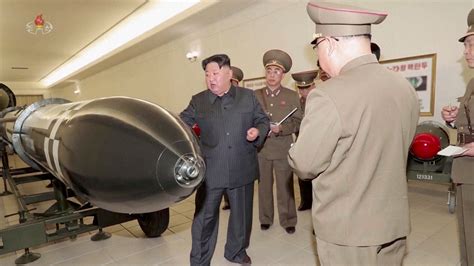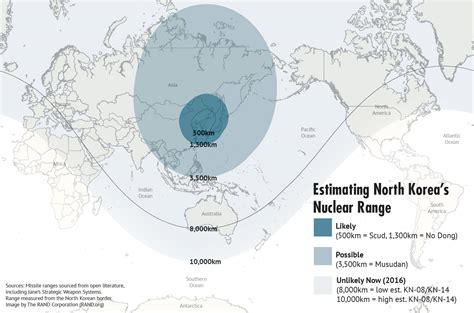North Korea And Nuclear

North Korea's nuclear program has been a topic of global concern and intense scrutiny for decades. The enigmatic nation, officially known as the Democratic People's Republic of Korea (DPRK), has embarked on a path towards developing nuclear weapons, leading to a complex and tense geopolitical situation. In this in-depth article, we will delve into the history, motivations, and implications of North Korea's nuclear ambitions, exploring the intricate web of international relations and the potential consequences for the world.
The Rise of North Korea’s Nuclear Capabilities

North Korea’s journey towards nuclear armament can be traced back to the early 1960s when the country initiated a secret nuclear research program. Over the years, it has made significant strides in developing its nuclear capabilities, often in defiance of international norms and treaties.
One of the key milestones in North Korea's nuclear timeline was the signing of the 1994 Agreed Framework with the United States. This agreement aimed to freeze North Korea's nuclear program in exchange for economic and energy assistance. However, the deal eventually collapsed, and North Korea resumed its nuclear activities.
Key Events in North Korea’s Nuclear History
First Nuclear Test (2006): On October 9, 2006, North Korea conducted its first underground nuclear test, causing global shockwaves. The test, which yielded an estimated yield of less than one kiloton, was a significant step towards the country’s nuclear ambitions.
Six-Party Talks (2003-2009): North Korea participated in a series of multilateral negotiations known as the Six-Party Talks, which included the U.S., China, Russia, Japan, and South Korea. These talks aimed to resolve the nuclear issue but ultimately failed to reach a lasting agreement.
Second Nuclear Test (2009): In May 2009, North Korea conducted a second underground nuclear test, this time with a yield estimated to be between 2 and 7 kilotons. The test was seen as a direct challenge to international efforts to curb its nuclear program.
Uranium Enrichment Program: North Korea’s revelation of its uranium enrichment program in 2010 added a new dimension to its nuclear capabilities. Uranium, when enriched, can be used as fuel for nuclear reactors or as the fissile material for nuclear weapons.
Third and Fourth Nuclear Tests (2013 and 2016): North Korea conducted its third and fourth nuclear tests in 2013 and 2016, respectively. These tests demonstrated the country’s advancing technical expertise and its determination to pursue a nuclear arsenal.
Intercontinental Ballistic Missile Tests (2017): In 2017, North Korea made significant progress in its ballistic missile program, testing intercontinental ballistic missiles (ICBMs) capable of reaching the U.S. mainland. This development heightened global tensions and concerns over the potential use of nuclear weapons.
| Nuclear Test | Date | Estimated Yield |
|---|---|---|
| First Test | October 9, 2006 | Less than 1 kiloton |
| Second Test | May 25, 2009 | 2-7 kilotons |
| Third Test | February 12, 2013 | 6-9 kilotons |
| Fourth Test | January 6, 2016 | 6-10 kilotons |

Motivations Behind North Korea’s Nuclear Pursuit

Understanding the motivations behind North Korea’s nuclear ambitions is crucial to addressing the issue effectively. While the exact reasons may be complex and multifaceted, several key factors have been identified.
Security Concerns
One of the primary drivers of North Korea’s nuclear program is its deep-seated security concerns. The country has a long history of feeling threatened by the United States and its allies. North Korea’s leadership views nuclear weapons as a critical deterrent, ensuring its survival and providing a powerful bargaining chip in international negotiations.
The legacy of the Korean War (1950-1953), which left the peninsula divided, still looms large in North Korea's collective memory. The country's leaders fear the possibility of regime change or invasion, and they believe that possessing nuclear weapons is essential for safeguarding their sovereignty.
Prestige and International Status
North Korea’s pursuit of nuclear weapons is also intertwined with its desire for recognition and prestige on the global stage. Becoming a nuclear-armed state grants North Korea a level of international attention and respect that it may not otherwise receive. It allows the country to assert its independence and challenge the existing world order.
By demonstrating its nuclear capabilities, North Korea seeks to influence global politics and gain leverage in negotiations. The country's leaders believe that possessing nuclear weapons enhances their diplomatic clout and gives them a stronger voice in regional and international affairs.
Economic Leverage
North Korea’s economy has faced numerous challenges over the years, including international sanctions and limited natural resources. Its nuclear program has served as a strategic tool to negotiate economic concessions and aid from other countries.
By engaging in nuclear brinkmanship and threatening to escalate tensions, North Korea has been able to extract economic benefits and aid packages from countries seeking to defuse the situation. This has provided the country with much-needed resources and a means to alleviate some of its economic pressures.
Implications and Global Impact
North Korea’s nuclear program has far-reaching implications, not only for the Korean Peninsula but also for the entire world. The proliferation of nuclear weapons and the potential for their use pose significant risks to global security and stability.
Regional Stability
North Korea’s nuclear ambitions have disrupted the delicate balance of power in Northeast Asia. The country’s provocative actions, including missile tests and nuclear threats, have strained relations with its neighbors, particularly South Korea and Japan.
The presence of nuclear-armed North Korea has prompted South Korea and Japan to enhance their own defense capabilities, including the development of missile defense systems and potential nuclear deterrence strategies. This arms race dynamic has the potential to escalate tensions and undermine regional stability.
Global Proliferation
North Korea’s nuclear program has also raised concerns about the potential for nuclear proliferation. The country’s advancement in nuclear technology and its willingness to engage in clandestine nuclear activities have sparked fears that its know-how and materials could be shared with other rogue states or terrorist organizations.
The international community has worked tirelessly to prevent the spread of nuclear weapons, and North Korea's actions challenge these efforts. The risk of nuclear technology falling into the wrong hands is a grave concern, as it could lead to further destabilization and the erosion of global non-proliferation norms.
Diplomatic Challenges
North Korea’s nuclear program has presented a complex diplomatic challenge for the international community. The country’s recalcitrant behavior and its refusal to engage in meaningful negotiations have hindered efforts to resolve the issue peacefully.
The United States, China, and other key players have attempted various diplomatic strategies, from direct negotiations to sanctions and pressure campaigns. However, finding a sustainable solution that addresses North Korea's security concerns while ensuring regional and global stability remains elusive.
The Way Forward
Addressing North Korea’s nuclear program requires a multifaceted approach that considers the country’s motivations and the complexities of the geopolitical landscape. Here are some potential strategies and considerations for the way forward:
Engaging in Meaningful Dialogue
Diplomatic engagement and dialogue are crucial to finding a peaceful resolution. Despite North Korea’s history of brinkmanship, there have been moments of progress, such as the 2018 Singapore Summit between North Korean leader Kim Jong-un and U.S. President Donald Trump. These high-level meetings provide an opportunity to build trust and explore potential agreements.
The international community should continue to seek avenues for meaningful dialogue, offering incentives and guarantees that address North Korea's security concerns. Engaging in direct talks can help reduce tensions and create an environment conducive to negotiations.
Multilateral Cooperation
Addressing North Korea’s nuclear program requires coordinated efforts from multiple countries. The Six-Party Talks, while unsuccessful in the past, demonstrate the importance of a multilateral approach. By involving key stakeholders, including the U.S., China, Russia, Japan, and South Korea, a more comprehensive and effective strategy can be developed.
Multilateral cooperation can help ensure that any agreements reached are binding and enforceable. It also provides a platform for sharing intelligence, coordinating sanctions, and implementing unified responses to North Korea's actions.
Sanctions and Pressure
Economic sanctions have been a key tool in the international community’s efforts to curb North Korea’s nuclear ambitions. Sanctions aim to exert pressure on the country’s leadership, limiting its access to resources and technologies needed for its nuclear program.
While sanctions have had some impact, they have not been enough to completely halt North Korea's nuclear progress. A more targeted and coordinated approach, coupled with increased enforcement, could potentially make sanctions more effective. However, care must be taken to avoid unintended consequences, such as exacerbating humanitarian crises within North Korea.
Promoting Denuclearization
The ultimate goal of the international community is the complete denuclearization of the Korean Peninsula. This would involve North Korea dismantling its nuclear program and eliminating its nuclear weapons arsenal.
Achieving denuclearization will require a combination of diplomatic efforts, sanctions, and the assurance of security guarantees for North Korea. It will be a long and challenging process, but it is essential for reducing the risks posed by North Korea's nuclear capabilities.
Conclusion

North Korea’s nuclear program remains a complex and delicate issue, with far-reaching implications for global security. The country’s pursuit of nuclear weapons has created a tense and volatile situation, requiring careful navigation by the international community.
By understanding the motivations behind North Korea's actions and engaging in meaningful dialogue, the world can work towards a peaceful resolution. Multilateral cooperation, targeted sanctions, and a commitment to denuclearization are essential components of a comprehensive strategy. The road ahead is challenging, but with persistence and a unified global effort, a safer and more stable future for the Korean Peninsula and the world can be achieved.
What are the potential risks associated with North Korea’s nuclear capabilities?
+North Korea’s nuclear capabilities pose several risks. Firstly, there is the potential for accidental or unauthorized use of nuclear weapons, which could lead to catastrophic consequences. Additionally, the country’s nuclear program could provide materials or knowledge to other states or non-state actors, increasing the risk of nuclear proliferation. Lastly, North Korea’s nuclear arsenal could escalate tensions and trigger a nuclear arms race in the region.
How has the international community responded to North Korea’s nuclear tests?
+The international community has responded to North Korea’s nuclear tests with a combination of diplomatic efforts, sanctions, and pressure campaigns. The United Nations Security Council has imposed multiple rounds of sanctions targeting North Korea’s nuclear and missile programs. These sanctions aim to restrict the country’s access to financial resources and limit its ability to develop and test nuclear weapons.
What are the prospects for denuclearization on the Korean Peninsula?
+The prospects for denuclearization on the Korean Peninsula remain uncertain. While there have been moments of diplomatic progress and high-level talks, North Korea has shown reluctance to completely abandon its nuclear program. Achieving denuclearization will require sustained diplomatic efforts, trust-building measures, and a comprehensive agreement that addresses North Korea’s security concerns while ensuring verification and enforcement mechanisms.



